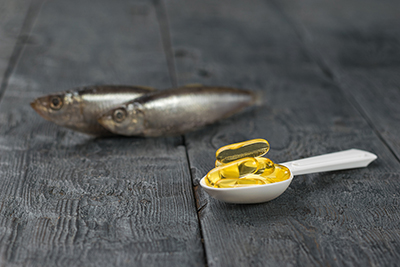
by Ludovic Brunel, ND
In the realm of natural health products, omegas have emerged as industry leaders, providing numerous benefits for our wellbeing. However, with a multitude of options available, selecting the right supplement can be a daunting task. Amidst the sea of numbers and variations, it’s crucial to understand the differences between omega‑3, omega‑6, omega‑7, and omega‑9, and how they impact our health.
What Do Omega‑3, ‑6, ‑7, and ‑9 Mean?
Omega‑3: An essential fat, meaning your body doesn’t produce any but needs it. Derived from seeds; nuts; and oily fish like sardines, anchovies, mackerel, and salmon. Helps improve heart health, fights inflammation, and supports mental health and cognitive function.
Omega‑6: Another essential fat, derived from eggs, poultry, red meat, corn, almonds, sunflower seed, walnuts, and hemp seeds. Provides energy; however, overconsumption can lead to inflammation.
Omega‑7: The last essential fat in this category. Derived from sea buckthorn, avocado, and macadamia nuts. Supports skin hydration, cardiovascular health, and eyesight.
Omega‑9: A nonessential fat, meaning your body produces its own. Derived from sunflower, safflower, walnut, cashew, almond, and chia seeds. Helps with cholesterol control, insulin resistance, and immune function.
Although each omega has its own benefits, for general health, omega‑3 fatty acids have been studied the most.
EPA v. DHA v. DPA: The Differences in Omega Fatty Acids
EPA, DHA, and DPA are types of omega‑3 fatty acids found in abundance in fatty fish and, in smaller amounts, in other seafood and algae. Within the omega‑3 family, we must factor EPA and DHA quantities more than DPAs. Researchers have extensively explored the health benefits of EPA and DHA, while those for DPA are still an ongoing area of study. Nevertheless, DPA is believed to contribute to cardiovascular health and to have anti-inflammatory effects.
Choosing the Optimal Ratios of EPA and DHA for Your Needs
Here are some general recommendations of ideal EPA-to-DHA ratios, based on conclusive scientific studies.
General Health: For overall support for brain function, cardiovascular wellbeing, and reduction in inflammation, look for an EPA-to-DHA ratio of 2:1.
Cardiovascular Health: Studies suggest that a higher intake of EPA relative to DHA, ranging from 1:1 to 2:1, may be beneficial for cardiovascular health.
Brain Health and Cognitive Function: Both EPA and DHA are very important for brain health and cognitive function. In adults, ratios from 2:1 to 6:1 have been effective. In school-aged children, a 2:1 ratio of EPA to DHA improves cognitive performance, including attention, memory, and problem-solving skills. Furthermore, studies have shown that a 2:1 ratio is also effective in reducing symptoms of attention-deficit/hyperactivity disorders (ADHD).
Inflammation and Joint Health: EPA, with its potent anti-inflammatory properties, is recommended for managing conditions such as rheumatoid arthritis. Studies suggest that ratios of EPA to DHA ranging from 1.5:1 to 5:1 may be more effective.
Mood Balance: Studies have shown that higher levels of EPA compared to DHA, ranging from 6:1 to 10:1, are effective in managing symptoms of depression and anxiety.
What’s Better for Me? Omega-Rich Foods or Omega‑3 Supplements?
 Obviously, in a perfect world, we would all simply eat the omega-rich foods we need. We would then benefit from a wide range of essential nutrients in their natural form, beyond just the omega‑3 fatty acids our diets require. But ask yourself the questions: Are sardines, mackerel, anchovies, or salmon in your family’s favourite recipes? How do you feel about nuts and seeds? Do you have any allergies or food aversions?
Obviously, in a perfect world, we would all simply eat the omega-rich foods we need. We would then benefit from a wide range of essential nutrients in their natural form, beyond just the omega‑3 fatty acids our diets require. But ask yourself the questions: Are sardines, mackerel, anchovies, or salmon in your family’s favourite recipes? How do you feel about nuts and seeds? Do you have any allergies or food aversions?
The reality is that omega-rich foods are not readily available or accessible to everyone. Even when we’re not going through an inflation crisis, the prices and selections of fresh omega-rich foods vary significantly by location and by season. You would also have to eat an inordinate amount of these whole foods, every day, to satisfy the EPA and DHA ratios you require. Luckily, supplements can fill the gap.
Omega‑3 supplements offer an unparalleled convenient and consistent way to ensure you have an adequate intake. They allow you to choose the specific EPA-to-DHA ratio you need to fulfill your optimal health requirements. It’s important to choose reputable brands that undergo strict testing for heavy metals, quality, purity, and potency. Unfortunately, most whole-food sources aren’t tested as rigorously.
Confused about Absorption?
When it comes to absorption, it’s important not to confuse degradation by stomach acid with absorption in the intestines. Fish oils actually benefit from some degradation by stomach acid. This initial breakdown process helps the bile and digestive enzymes to emulsify the fats in the small intestine. This being said, they don’t require additional protection. Studies comparing enteric-coated to non–enteric-coated fish-oil supplement capsules have shown either no difference in absorption, or reduced absorption in the intestines with enteric-coated capsules.
 What about Fishy Burps?
What about Fishy Burps?
Some individuals may experience fishy burps as a side effect of taking omega‑3 supplements. Ironically, these could be a warning sign for other issues. If the only fat you burp up is the fish oil, it could be the quality. However, if you burp up all fats, you could have low stomach acid (especially if you are taking antacids), or you may be lacking digestive enzymes or have an insufficient production of bile. Whichever the case, you could try a digestive enzyme with betaine hydrochloride with your meals.
Try these tips:
- Check expiry date. Softgel capsules prevent oxidation, while liquid form must be consumed within 30–40 days once bottle is open.
- Take fish oils with food and a glass of water.
- Choose a high-quality fish oil that’s been tested for heavy metals, contaminants, as well as oxidation in an ISO 17025–accredited laboratory.
- Choose an omega with added lemon essence.
- Freeze the capsules to bypass stomach degradation. Its contents can then be released in the intestine.
Be smart: Strive to increase omega-rich foods in your diet, or choose the omega supplement with the appropriate EPA and DHA ratio that’s been proven to support your health needs.
Be savvy: When choosing supplements, invest in the protection of enteric coating on supplements that actually need protection from stomach acid, like probiotics.







